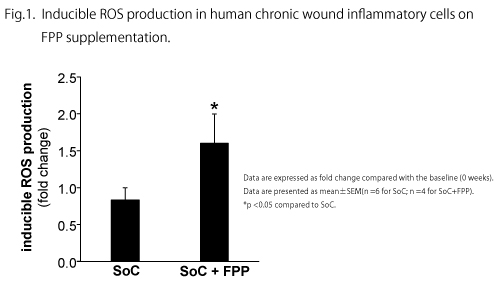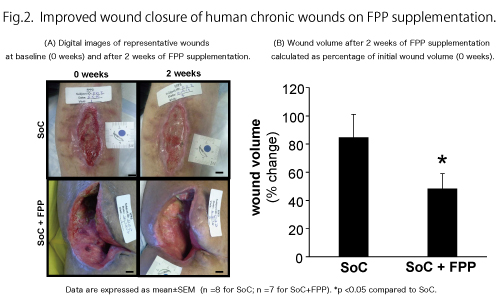Research
May Dietary Supplementation Augment Respiratory Burst in Wound-Site Inflammatory Cells?
FILE2017
May Dietary Supplementation Augment Respiratory Burst in Wound-Site Inflammatory Cells?
Antioxidants & Redox Signaling, 2018 Feb 10;28(5):401-405.
Persistent infection contributes to wound chronicity. At the wound site, NADPH oxidase (NOX) activity in immune cells fights infection to enable the healing process.
Fermented papaya preparation (FPP) is a carbohydrate-rich nutritional supplement that has demonstrated ability to bolster respiratory burst in experimental rodent systems. In FPP, glucose coexists with fructose and maltose in addition to multiple other sugar alcohols such as inositol. We have previously reported that FPP supplementation augments wound healing in diabetic mice via improvement of respiratory burst activity of wound innate immune cells.
Subjects participating in this clinical study were 22 patients with chronic wounds undergoing negative pressure wound therapy. They were randomly assigned to two test groups, one without supplementation (SoC) and the other with a controlled dose of FPP (SoC+FPP; 3g/dose, 3dose/day). Inducible ROS production and wound volume were measured at baseline (0 weeks) and after 2 weeks. Peripheral blood was drawn from patients and HbA1c, glucose, lipid parameters were measured to evaluate safe oral consumption of FPP by chronic wound patients. Inducible production of ROS was significantly higher in wound-site immune cells from patients receiving SoC+FPP for wound management compared with those patients receiving SoC alone (Fig.1). Wound closure in FPP-supplemented patients showed improvement (Fig.2).
Importantly, the consumption of this mixture of carbohydrates, including significant amounts of glucose, did not increase HbA1c. These observations warrant a full-length clinical trial testing the hypothesis that FPP improves wound closure by augmenting NOX activity in immune cells at the wound site.


